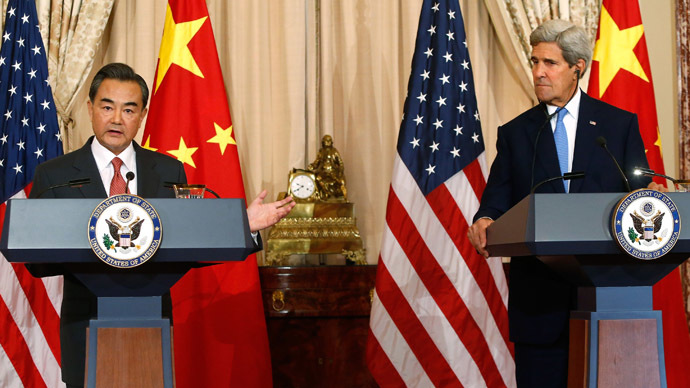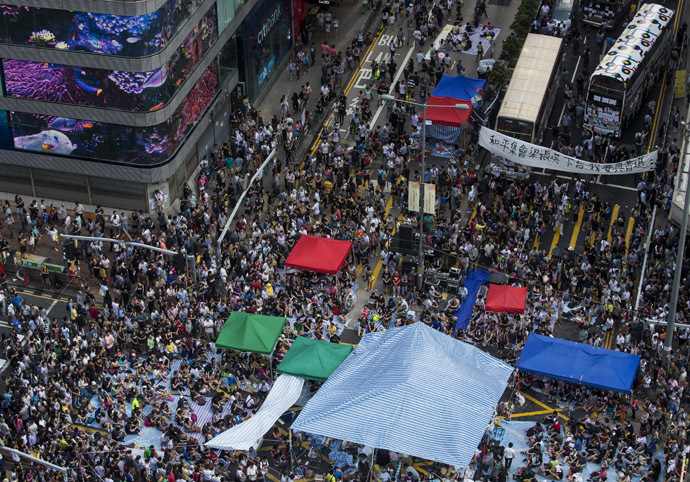‘Internal affair’: Beijing warns foreign countries not to meddle in Hong Kong

China’s foreign minister made it clear Beijing would not allow other countries to meddle into its ‘internal affairs’, responding in this way to US Secretary of State’s call for Beijing to grant Hong Kong the “highest possible degree of autonomy.”
The American and the Chinese heads of foreign offices exchanged
their views on the massive protests in Hong Kong before their
talks at the US State Department on Wednesday.
"Hong Kong affairs are China's internal affairs,”
Chinese Foreign Minister Wang Yi said. “All countries should
respect China's sovereignty. And this is also a basic principle
governing international relations. I believe for any country, for
any society, no one will allow those illegal acts that violate
public order.”
Wang added he believed the current Hong Kong leadership was able
to handle the large-scale sit-ins by itself.
The remark was made after US Secretary of State John Kerry
reiterated Washington’s support for “universal suffrage”
in Hong Kong, the main demand put forward by protesters in the
Asian financial hub.
"We support universal suffrage in Hong Kong accordant with
the Basic Law, and we believe in open society with the highest
possible degree of autonomy and governed by rule of law is
essential for Hong Kong's stability and prosperity," Kerry
said.
Wang Yi received the same message from Barack Obama, whom he met
later the same day, according to a White House statement about
the meeting.
"The United States has consistently supported the open system
that is essential to Hong Kong's stability and prosperity,
universal suffrage, and the aspiration of the Hong Kong
people," the statement reads.
Protesters in Hong Kong have been demanding election reform.
They’re against the central government’s August decision to only
allow Beijing-approved nominees run for the city’s leader post in
the next election in 2017.

Sunday’s massive crackdown on thousands of protesters, when police
use of tear gas, pepper spray and baton charges did not lead to a
dispersal of the crowds. What it did inspire is more anger with
Hong Kong's current leader, Leung Chun-ying, with protesters
starting to demand his resignation.
On Wednesday, a leader of the pro-reform protests warned the
demonstrators were ready to occupy government buildings if the city’s chief
didn’t step down by the end of Thursday.
An unnamed government source close to Leung says Hong Kong's
chief executive is ready to wait for weeks for the protests to
quiet down.
"Unless there's some chaotic situation, we won't send in riot
police... We hope this doesn't happen," the source told
Reuters. "We have to deal with it peacefully, even if it
lasts weeks or months."
#INFOGRAPHIC: Updated map of the main protest zone in #HongKong on Thursday pic.twitter.com/rNiHFLCEan
— Agence France-Presse (@AFP) October 2, 2014
Beijing has backed the Hong Kong authorities and accused
protesters of dragging the city into “chaos,” as can be grasped
from a commentary published on Thursday in the People's Daily, a
mouthpiece of the Chinese government.
It said that the rule of law must be safeguarded "in order to
realize the healthy development of democracy and politics in Hong
Kong," as cited by AP. "Handling affairs without
following laws, Hong Kong society will be in chaos."
Tension flared in the streets of Hong Kong on Thursday after police started carrying boxes and barrels of ammunition to buildings surrounded by protesters.
Very public #HongKong police equip. re-supply includes 70 rounds of "small arms shotgun ammo" and a corrosive element pic.twitter.com/He8sJb2zuS
— SCMP VideoMoJo (@SCMPVideoMoJo) October 2, 2014
Rally participants, angered by police’s actions, tried to block
their way. The city’s authorities issued a statement, urging
protesters to quickly disperse.
"The government and the police appeal to those who are
gathering outside the police headquarters, CGO [central
government offices] and CEO [Chief Executive's office] not to
block the access there and to disperse peacefully as soon as
possible," the statement said, as cited by AFP.
Students began their sit-ins on September 22. Within a few days
they were supported by leaders of the broader Occupy Central
civil movement, turning the protest into one of the city's
largest rallies in decades.
The #OccupyCentral hashtag has eventually gone viral online with
umbrellas, used by the rally participants to cover themselves
from tear gas and pepper spray becoming symbols of the protest.














